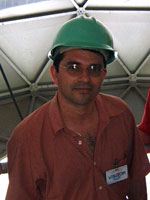
Assistant Professor, Dept. of Electrical Engineering,
University of Puerto Rico at Mayaguez
PaSSER Program Director
Dr. José M Rosado Román:
Assistant Professor, Dept. of Electrical Engineering,
University of Puerto Rico at Mayaguez
PaSSER Program Director
José is an active member of the American Geophysical Union, the Institute of Electrical and Electronic Engineers, and CIAPR. He is also an active-for-life member of the Phi Kappa Phi Honor Society and the Tau Beta Pi Engineering Honor Society.
INTERVIEW:
What is your educational background?
I obtained a BS in Electrical Engineering from UPR-Mayagüez in 1989, an M.Eng in Electrical Engineering from Cornell University in 1990 and the PhD in Electrophysics from Cornell University in 1999
What was your motivation to continue your studies?
A long time ago, a NASA interviewer named Roberto Alemán who also studied at UPRM, talked to me about the Combined Release and Radiation Effects Satellite (CRRES), the parent of the Coqui I and II Ionosphere Probe. These were NASA sounding rockets carrying research payloads.
What are your teaching interests?
My primary teaching focus is to assure the interest in space studies of my Physics and Electrical Engineering students. I want to assure that my students find good jobs in the modern science fields and also play a productive role in society.
What are your research interests?
As an aeronomer, I study the earth’s Ionosphere, particularly the E region sporadic layers, the ones that get formed at a height of 90km.
His research interests include investigation of ionospheric plasma instabilities in the E and F regions of the ionosphere. His thesis work was accepted for presentation at a recent biannual meeting of the American Geophysical Union held at Boston: J.M. Rosado-Román, W.E. Swartz, D.T. Farley and C.E. Seyler, “Coherent Scatter Radar Instabilities Observed Over Arecibo and Proposed Non-local Linear Gradient Drift Theory”, EOS, Trans., American Geophysical Union, Vol. 82, No. 20, 2001.
He has recently submitted two papers for publication in the internationally recognized Journal of Atmospheric and Solar-Terrestrial Physics: J.M. Rosado-Román, W.E. Swartz and D.T. Farley, “Plasma instabilities observed in the E region over Arecibo and a proposed nonlocal theory”, J. Atmos. Sol.-Terr. Phys., 65, submitted, 2003. C.E. Seyler, J.M. Rosado-Román, D.T. Farley, “Nonlocal gradient-drift instability at mid-latitudes”, J. Atmos. Sol.-Terr. Phys., 65, submitted, 2003.
José’s work is currently funded by Cornell University, the National Astronomy and Ionosphere Center, and locally by the Industrial Affiliates Program (IAP). Proposals that are currently in progress: (1) Cornell Studies of the Ionosphere – This grant funds maintenance of the Cornell University Portable Radar Interferometer (CUPRI 50 MHz radar) currently stationed at the Agricultural Experimental Station at Isabela. (2) Horizontal Structure of Sporadic-E using dual beam – José is one of the first scientists in the world to take advantage of the new 430MHz dual beam capability currently available at the Arecibo Observatory. (3) Bringing real-time data processing to the Atmospheric Phenomena Laboratory’s lightning location network – an IAP sponsored project addressing the need for real-time networking, this project allows undergraduate students to gain experience in solving networking problems while attending a need that currently lacks attention in Puerto Rico. http://webflash.ess.washington.edu/
What are your plans for the future?
My goal is to develop an atmospheric/ionospheric research program at UPR-Mayagüez in cooperation with collegues at UPR-Mayagüez, the Arecibo Observatory, and the University of the Virgin Islands and Cornell University.
I’m also interested in studying plasma physics.
What courses do you regularly offer?
Advanced Electromagnetics (graduate)
Radar Introductions
Telecommunication Electronics
For more info please visit my website at
http://ece.uprm.edu/~jrosado/